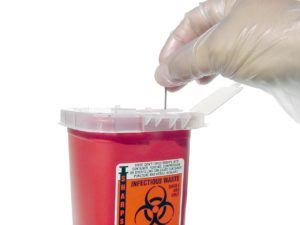Medical Waste Transporters
Are you struggling with managing medical waste at your facility? It’s a common issue many healthcare providers face. Improper disposal can lead to serious health risks and hefty fines. Medical Waste Transporters!


Medical waste transporters play a crucial role in safely moving hazardous materials from healthcare facilities to disposal sites. These professionals ensure all regulations are met, protecting both the environment and public health.
This article will show you how our services at Biohazard Waste Disposal can help solve your medical waste problems effectively. Keep reading to find out more!
Transporting Medical Waste
- Medical waste transporters ensure the safe and compliant movement of hazardous materials from healthcare facilities to disposal sites.
- Compliance with local, state, and federal regulations is critical for reducing health risks and avoiding legal penalties.
- Proper handling involves using approved containers, specialized vehicles, and certified drivers to prevent leaks and contamination.
- Professional services help minimize liability by securing safe disposal of biohazardous waste following strict safety protocols.
Services Offered – Medical Waste Transporters
Our team specializes in the safe collection and transport of medical waste. We ensure every step follows strict regulations and guidelines for proper disposal.
Collection and transport of medical waste
The company manages the safe and efficient collection of medical waste from healthcare facilities. The team makes sure all biohazardous materials are securely packed in approved containers before they leave the premises.
Infectious and hazardous materials must follow strict packaging guidelines to prevent leaks and contamination during transport.
Vehicles used for transportation meet rigorous safety standards set by medical waste regulations. Drivers hold valid permits, ensuring lawful and secure transit of biomedical waste.
Each step is meticulously recorded, maintaining a clear chain of custody from collection to final disposal.
Compliance with regulations and guidelines
Compliance with regulations and guidelines is crucial for medical waste transporters. This service ensures adherence to all local, state, and federal laws governing biomedical waste transportation.
The team stays updated with current regulations to avoid any legal issues or penalties.
They maintain strict protocols for handling infectious substances and hazardous materials as per EPA standards. Each step in their process meets the requirements set by OSHA and DOT, ensuring safe and lawful operations.
This commitment not only protects public health but also safeguards the environment from potential contamination.
Proper handling and disposal of all types of medical waste
Proper handling of medical waste ensures safety for healthcare workers and the public. Medical waste, which includes used needles, bandages, and gloves, must be separated from regular trash.
Specialized containers clearly labeled as biohazard are necessary for sharp objects like needles.
The disposal process involves incineration or sterilization to neutralize harmful pathogens. The proper procedure follows all regulations for disposing of infectious substances safely.
This reduces environmental impact and prevents contamination risks.
Ensuring compliance with regulations is essential for maintaining a safe environment.
Benefits of Professional Services
Professional services ensure the safe transport and disposal of medical waste. They use specialized equipment and follow strict protocols to minimize risks.
Ensures compliance with regulations
Medical waste transporters adhere to stringent regulations to ensure safe and lawful disposal of hazardous materials. Compliance with these regulations protects both public health and the environment from potential dangers associated with biomedical waste.
Transporting infectious substances requires specific permits, proper labeling, and documentation to meet federal, state, and local guidelines.
Failure to comply can result in hefty fines and legal consequences for businesses. By strictly following the rules, biohazard waste disposal minimizes risks and ensures that all handling processes are secure.
This guarantees peace of mind for healthcare providers relying on their services.
– Reduces liability and risk
Reduces liability and risk
Improper medical waste management can lead to significant legal and financial repercussions. Professional medical waste transporters follow strict regulations, ensuring all hazardous materials are handled correctly.
They minimize the risk of contamination and prevent potential lawsuits.
Using licensed biomedical waste transporters also protects healthcare facilities from hefty fines for regulatory non-compliance. Expert handling of infectious substances eliminates risks for staff and patients, creating a safer environment overall.
Ensuring biohazard materials are disposed of according to guidelines safeguards your practice from liability issues.
Provides safe and secure transport and disposal – Medical Waste Transporters
Trained medical waste transporters not only minimize liability but also ensure the safe and secure movement of hazardous materials. They use specially designed vehicles with advanced technology to prevent leaks and contamination while on the road.
Certified handlers follow strict guidelines for disposing of medical waste, in line with all regulatory standards. This guarantees that biohazardous materials are treated and disposed of in a way that reduces environmental impact and safeguards public health.
Why Choose Us? Medical Waste Transporters
We offer licensed and certified medical waste transportation with experienced staff ready to provide reliable service.
Licensed and certified medical waste transporters
Licensed and certified medical waste transporters play a crucial role in ensuring safe and compliant disposal. They hold all necessary permits to handle various types of hazardous materials, including infectious substances.
With strict adherence to medical waste transportation regulations, services operate smoothly while minimizing environmental impact.
Experienced staff members undergo rigorous training to maintain high standards. This ensures the proper handling and secure transfer of biomedical waste from healthcare facilities to designated disposal sites.
Utilizing advanced equipment guarantees efficient service delivery without compromising safety protocols throughout the process.
Experienced and knowledgeable staff
Our team of experienced and knowledgeable staff at biohazard waste disposal ensures the highest standards in medical waste transportation. With years of expertise, our professionals are trained to handle all types of biomedical waste safely.
Their thorough understanding of medical waste regulations guarantees compliance with all local, state, and federal guidelines.
Our staff undergoes regular training sessions to stay updated on the latest safety protocols. This commitment to continuous education means that our clients can trust in the secure transport and disposal of hazardous materials.
Next, learn about how we strictly adhere to safety protocols for each service provided.
Strict adherence to safety protocols – Medical Waste Transporters
Strict adherence to safety protocols ensures that medical waste is handled and transported safely. Our licensed and certified biomedical waste transporters follow strict guidelines set by medical waste regulations to protect the public and environment.
All staff undergo rigorous training on handling hazardous materials, ensuring compliance with all safety standards.
Failure to adhere to these protocols can lead to serious health risks and legal consequences. By maintaining a high standard of care in infectious waste transportation, we minimize potential hazards.
This commitment also reduces liability for healthcare providers who rely on our services for their biohazard waste disposal needs.
Reliable and efficient service
Our team of licensed and certified medical waste transporters provides reliable and efficient service. We handle the collection, transportation, and disposal of all types of biomedical waste with precision.
Using state-of-the-art vehicles equipped for hazardous material transport, we ensure safe and secure delivery to disposal facilities. Our experienced staff follows strict protocols to stay compliant with all medical waste regulations.
Contact Us – Medical Waste Transporters
Ensuring the safe transport of medical waste is crucial. Biohazard waste disposal provides top-notch services to meet this need. Licensed and certified, we prioritize safety in every step.
Our experienced team adheres strictly to regulations. We offer reliable and efficient transport solutions for all types of medical waste.
Trust our proven track record for secure handling and disposal. Protect your facility with our comprehensive medical waste management services. Contact us today to find out how we can support your needs!





